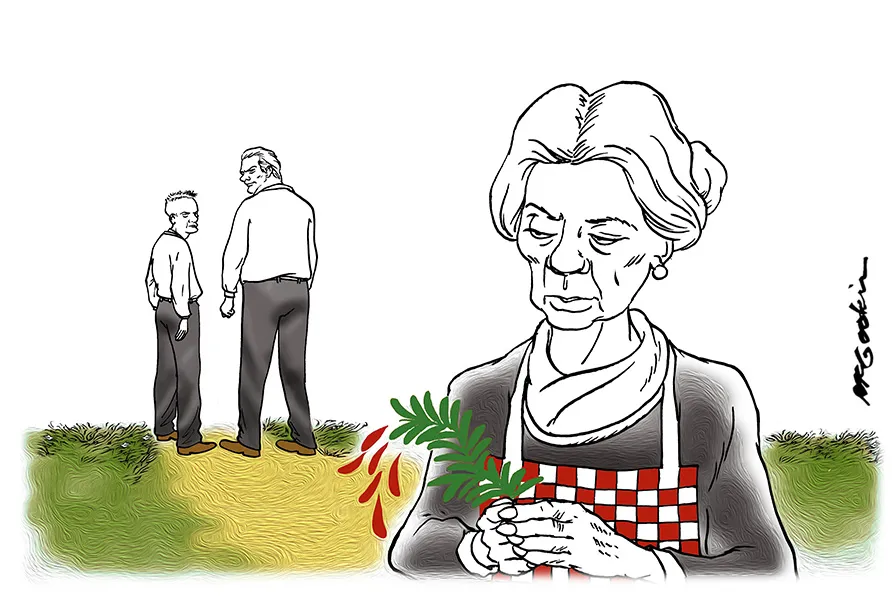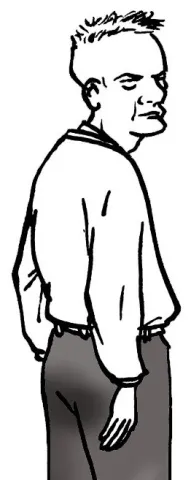Releases from Rahsaan Roland Kirk, Maggie Nicols/Robert Mitchell/Alya Al Sultani, and Gordon Beck Trio and Quintet
When a couple moves in downstairs, gentrification begins with waffles and coffee, and proceeds via horticultural sabotage to legal action

 Illustration by Malc McGookin
Illustration by Malc McGookin
THIS morning, she said: “I’ve got asthma, a heart condition, balance problems and I’m 90 for God’s sake! I shouldn’t have to define myself this way just because of them. It’s humiliating! Is that all I am?”
She is talking about the people downstairs again. Since the last letter she can’t get them out of her mind. “It’s affected me in so many ways that I can’t really put my finger on it, physically, mentally, spiritually. It’s completely affected who I am.”
There were signs, but they were indecipherable at the time. Just a chilling note shaking your body. Take the piano playing by the one with the cold grey eyes and rigid neck who we secretly named Steel. The music was classical, but it wasn’t music. Not the way it was executed. It was like chopping up something with a very sharp knife. Cut, cut, cut, it went; precise, methodical, a cruel dissection. I had to turn on the radio to drown it out.
This was when we were still on good terms. The other one we thought of affectionately as the big friendly one or the hulk who, towering above my mother, once declared: “We are so blessed to have you as our neighbour.” When they went on cycling trips, clad in Lycra, we would look after their cat in their pristine, strangely empty flat on the ground floor. We could help ourselves to anything, they said, but there was nothing there.
They were always grateful for the cat-sitting. We were invited for waffles (home-made in a shiny waffle maker); or they would ply us with the sweet things the big friendly one, often on a diet, didn’t want in the house. It was touching, though we weren’t particularly keen on confectionery. It struck me that when we did ask for help with their expertise, in technology or bikes say, we would be met with blank looks. I even thought I could detect a hint of contempt or anger. That’s easy to say with hindsight. But there was that feeling: a kind of confusion coupled with a deep chill. A low dark note as if everything stands still, waiting for you to understand.
They were very helpful with the things they thought we needed. Take, for example, the ebullient rosemary bush that had grown for the last 50 years in the front garden. It was famous in the area. The locals would come and take sprigs for their Sunday roasts. The rosemary proudly climbed the wall and waved luxuriously over the shared path where the neighbours’ plant pots line up like soldiers, gradually increasing in number and size.
My mother often used to be seen outside tending to her plants. On that day the big friendly one appeared suddenly and loomed over her. He spoke fondly of cats and plants and an offer was made: “Shall we help you cut the rosemary back? It’s getting a bit wild.” That was always the way. The friendly one would emerge first. Small talk would evolve into suggestion. Then Steel would appear to finish the job, blade in hand: cut, cut, cut. My mother was touched by such kindness. As she said, “I’m not as strong as I used to be.”

The rosemary is hacked to an inch of its life, as is the magnificent firethorn in the back yard that has also been “tidied up a bit”. I stepped in to advocate for the little blue flowers in the cracks of the shared path even though they said the roots were damaging their York paving. The rosemary struggled back to life and gradually regained its lush, wild presence; but the firethorn didn’t make it. Then one day we find the rosemary dead. Overnight it had gone from green to brown. One of the sprig collectors commented: “It’s as if it has been poisoned.” Steel looked on, expressionless as my mother tried to hold back her tears.
The final waffle brunch. The big friendly one is passing the maple syrup, making light, inane conversation deemed suitable for the elderly. It is as if there is a script, a very boring one, and it is hard to interrupt. Everything is being passed around politely, and the tone is jolly, patronising. Meanwhile, Steel is staring into space, stiff-backed, not blinking. He is reciting a list like a litany: “We are worried about our investment. There is a lot of work to be done on the property, pipes, water, roof, tiles, walls, paving.” It is as if he is in a trance. The coffee, from their professional machine, is overpowering. My head is swimming in confusion, and there is that feeling again: a crashing, low note as if to say, “Wake-up!”
It takes a few days to emerge from the confusion and we say to each other, my mother and I: “Did you feel that? Was it strange? What happened?” She said: “I felt as if I was being eviscerated. When they verbally dismantled every part of the house, saying that it had been neglected, was old, and everything needed to be taken down and replaced, that it was affecting their investment, I felt as if I was being taken apart, bit by bit, cut by cut.”
The problem, it seemed, was a damp patch in their kitchen, above the picture rail they said, but they didn’t show us. They thought it was caused by a leak in the gutter, the fascia was all wet, apparently, from water spilling over. I explained how it could be dried out and how to fix that section of pipe. They knew I had once trained as a plumber; but when I tried to help there was that blank look, even a hint of hatred.
It became uncomfortable to be outside. Whenever my mother tended her garden, the same themes would be pressed: investment, improvement, the list. I didn’t escape the onslaught either. Exhausted, my mother agreed to have the guttering inspected. After all, as she confided: “I just want to do the neighbourly thing; it is better for them to have peace of mind and see there is nothing seriously wrong. At least it will keep them from constantly nagging.”
It was me that protected her from what unfolded. The elderly are easy prey, but I was in the way. A builder she had never met before, who had had ripped away all of the guttering was now saying: “So the damp in the kitchen is caused by the roof; it has microfractures; we’ll need to take the whole thing off, the tiles, rafters, cables and wires.” I saw her go ashen, become confused, though valiantly she said: “No, I’m not doing that.” Then I saw her waver as Steel came very close, rigid, unblinking and said in a thunderous whisper: “I am very, very worried about my investment,” adding, as if kindly, “but I can give you a couple of minutes to decide.”
I led her away from the scene. Her tiny frame was trembling, and she seemed to be fighting something in herself. The repeated knocking on the door, the pressure, the claims that she would be responsible for leaving everybody “significantly out of pocket” if she did not agree RIGHT NOW continued. But this was only the beginning. The act of resistance produced a revelation.
A week later my mother and I show a handyman the damage caused by the rogue roofer. Out of nowhere the big friendly one is upon us, face scarlet, jowls quivering with rage. “Get off my property; get off my property!” Huge hands are trying to turn the hose on us, as if to wash us away; a spoilt mouth is bellowing that I am “ridiculous” and my mother, “disgusting”. The friendly neighbour façade is finally extinguished. In an act of self-preservation, the handyman begins to record the scene. “This is up to the police, the judge and the court. I have just been asked to fix the gutters. This is nothing to do with me.” Steel remains inside to write legal threats by email.
Since then, the piano playing has stopped, and their appointed solicitors have sent many letters, each one more threatening than the last. They say: “You may be liable to pay our clients’ legal costs.” They order my mother to remove her plants, her bins, her washing stand; in other words, to remove herself. There are accusations of hidden historical damage and breaches of the lease. There is no mention of the rogue roofer, the harassment and the hose. A former sprig collector, who happens to be in the legal field looked sad and wise when he said: “They are trying to say you have breached the shared freehold so that they can take it over.”
My mother shakes all the time now. She says: “I spent my whole life paying for this place; it’s as if they are trying to kill me.” I think: “Yes they are, but legally, and so untraceably, like the rosemary.”
Maybe this type of murder is the price you pay for gentrification. It unfolds gently to the aroma of fresh coffee, to Lycra drying above York paving, and waffles for brunch. It is the banality of evil festering in the neatly lined up pots, clinically executed notes, and a jolly façade. Uncannily it sometimes feels as if they are trying to inhabit us in order to flesh out their own inner pointlessness. Yet when parasites colonise a body, if the body dies then so do they.
Lisa Brown is a London-based writer, artist and carer.

JOHN GREEN welcomes a remarkable study of Mozambique’s most renowned contemporary artist

In his second round-up, EWAN CAMERON picks excellent solo shows that deal with Scottishness, Englishness and race as highlights

Badenoch under pressure to sack shadow justice secretary










